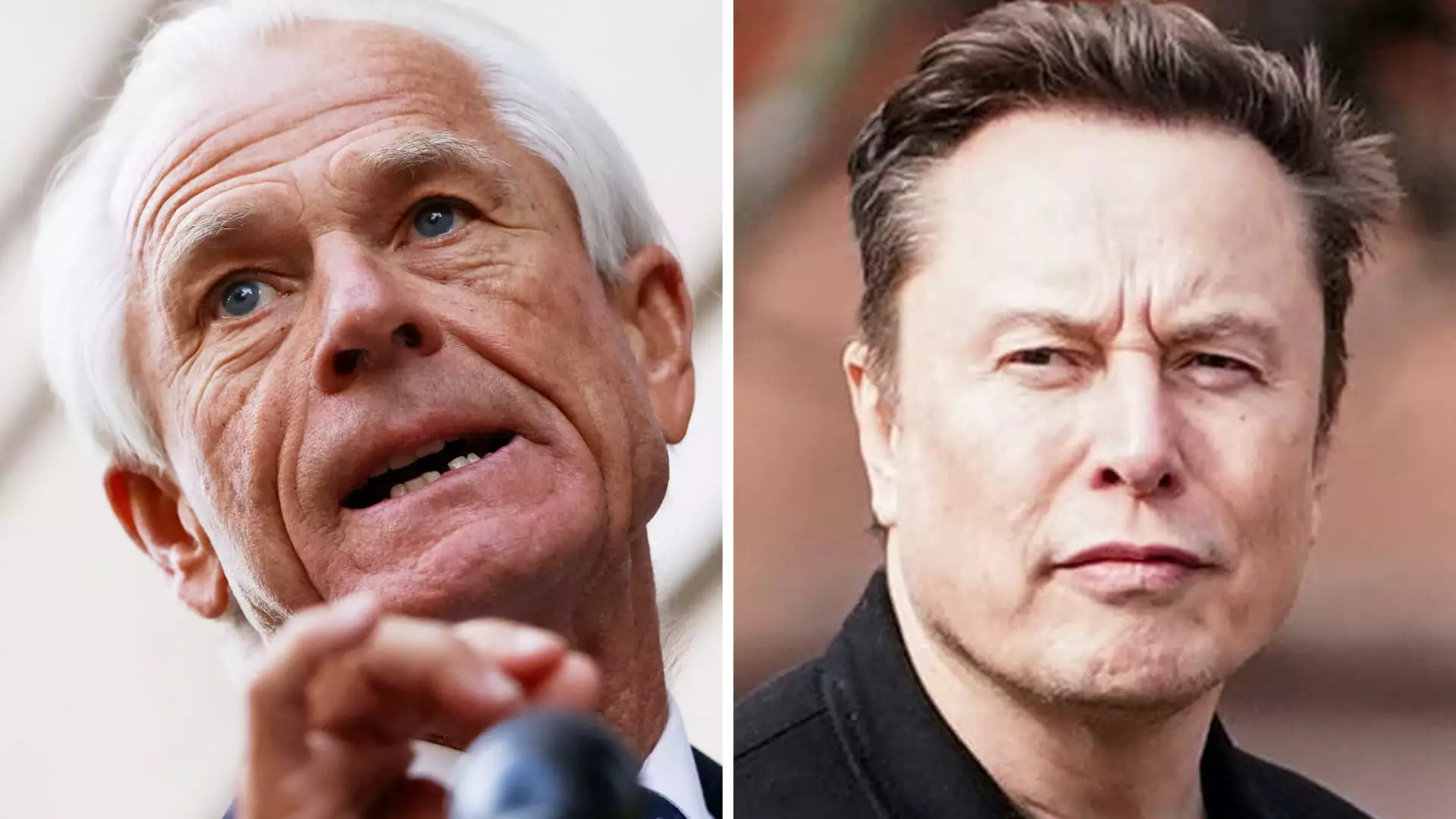In recent weeks, the discourse surrounding U.S. trade policy has witnessed the fascinating interplay between established economic principles and the audacious spirit of innovation that tech giants like Elon Musk embody. A striking example of this dynamic is the contentious relationship between Peter Navarro, a top trade aide in the Trump administration, and Musk, a billionaire entrepreneur whose enterprises challenge the very fabric of traditional economic thought. The tension between these two figures epitomizes a larger ideological rift in contemporary American politics—one that oscillates between protectionism and globalization.
Navarro, with his Harvard pedigree and firm advocacy for tariffs, represents a school of thought that championed American manufacturing and the concept of ‘America First.’ He aims to resurrect industries by insisting that products must not merely be assembled in the U.S., but manufactured from the ground up. In stark contrast, Musk, whose company Tesla prides itself on utilizing global supply chains to produce electric vehicles, has openly criticized Navarro’s position. This conflict illuminates the multifaceted challenges facing policymakers; they must navigate the complexities of trade while simultaneously fostering innovation and entrepreneurship.
Contradictory Views on Trade
The crux of the disagreement is Navarra’s insistence on localizing production to rejuvenate American manufacturing jobs. His perspective reflects a belief that tariffs serve as tools to protect domestic industries from foreign competition. Musk’s retort, branding Navarro a “moron,” unveils a critical underpinning of their conflict: a fundamental disagreement on the nature and future of American industry. Musk emphasizes that while Tesla may import components, the company’s manufacturing processes contribute immensely to the U.S. economy through job creation and technological advancement.
This discourse brings to light a challenging reality: industries today operate on global scales, and isolationism may jeopardize the innovative potential that thrives when companies engage with international markets. Musk’s assertion that he produces “the most American-made cars” points to the evolving nature of what it means to be an ‘American manufacturer’—one that doesn’t fit neatly into the nostalgic images of plants dedicated solely to domestic materials.
The Public’s Perception and Political Ramifications
Interestingly, the public’s perception of Navarro’s and Musk’s conflicts and sentiments could shape the political landscape as the U.S. heads into a complex electoral period. The intertwining narratives of traditional economics and progressive innovation resonate with a populace that increasingly values flexibility and evolution over stagnation. This clash of ideologies might influence voters’ preferences across various demographics—particularly among young, tech-savvy constituents who see the urgency of global engagement in addressing climate change and economic resilience.
Moreover, Navarro’s deflection of toxic criticism towards Musk by downplaying their differences sends mixed signals about the administration’s stance on trade policy. While he praises Musk for efforts to combat waste and fraud in government, he remains steadfast in his belief in tariffs, suggesting a disjointed approach within the Trump administration itself. This division hints at a broader uncertainty about the future direction of American trade policy and poses questions about the sustainability of such an approach in an era characterized by rapid global change.
Innovation vs. Tradition: The Future Outlook
In navigating this precarious landscape, it becomes vital to critically reassess what vision for trade will foster a robust and resilient economy. Can the U.S. truly thrive by fully embracing tariffs, or does a more nuanced strategy that combines protectionism with creativity and interdependence offer the necessary framework for the future? The competition between emerging industries and traditional manufacturing is not merely a policy discussion but a reflection of America’s identity as a nation of both innovators and workers.
It’s clear that both Navarro and Musk hold vital truths; America must find a balance between fostering homegrown innovation and protecting domestic jobs. The current political discourse offers a fertile ground for such deliberations, but it will require courageous leadership willing to transcend traditional lines in favor of a more comprehensive policy that responds dynamically to the realities of a global economy.
As the trade landscape continues to evolve, the stakes couldn’t be higher. The consequences of these debates reach far beyond the White House and into the lives of everyday American citizens who seek economic stability, opportunity, and the promise of a prosperous future, unshackled by outdated economic ideologies.

Leave a Reply